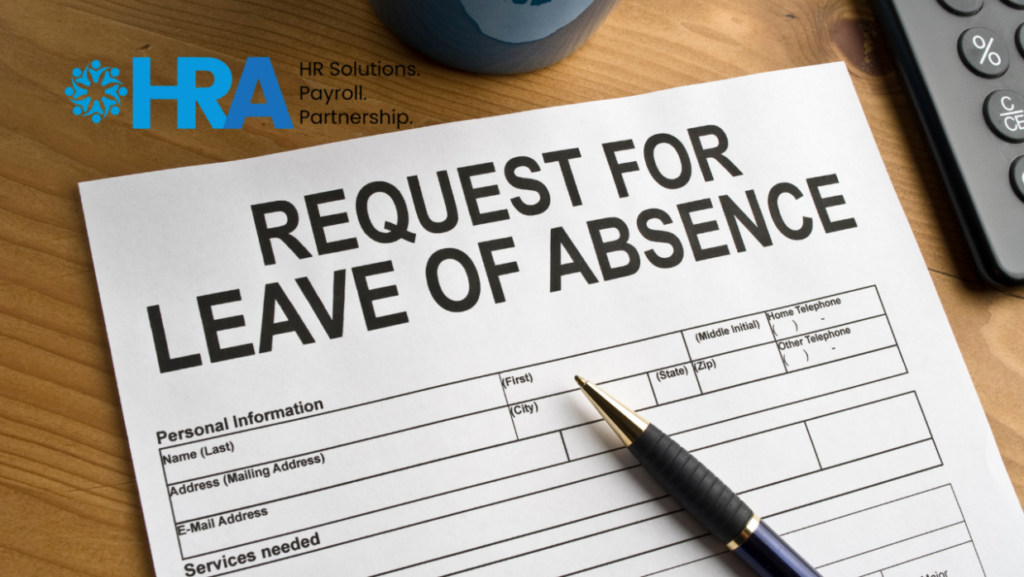Managing employee leaves of absence can be complex and challenging for small businesses, with a myriad of laws, regulations, and company policies to navigate. As a small business owner, it’s essential to understand the various types of leave – such as the Family and Medical Leave Act (FMLA), maternity and paternity leave, and extended sick leave – as well as the associated eligibility criteria and requirements.
Moreover, ensuring your company remains compliant with relevant laws and regulations, while also minimizing disruptions to your operations during employee absences, can be a daunting task. In this blog post, we will delve into the complexities of employee leaves of absence, offering guidance on navigating the relevant laws and regulations and demonstrating how The HR Ally’s platform can simplify leave management and ensure compliance.
Employee leaves of absence pose unique challenges for small business owners, including deciphering the nuances of various regulations and managing staffing needs during a team member’s extended absence.
By understanding the different types of leaves and their requirements, business owners can effectively manage these situations with confidence, ensuring that their employees are treated fairly and their organization remains compliant.
To help navigate the complexities of employee leaves of absence, The HR Ally’s platform offers valuable tools and resources, empowering small business owners with the tools they need to manage leave requests, track employee leave time, and maintain compliance with relevant laws and regulations. In the subsequent sections, we will explore key aspects of managing different types of leaves of absence and illustrate how The HR Ally’s platform can support your small business throughout this process.
Understanding Family and Medical Leave Act (FMLA) Guidelines
The Family and Medical Leave Act (FMLA) is a federal law that provides eligible employees with up to 12 weeks of unpaid, job-protected leave per year for specified family and medical reasons, including the birth of a child, adoption, serious health conditions, or caring for an immediate family member with a serious health condition. While FMLA generally applies to businesses with 50 or more employees, small business owners should be aware of FMLA guidelines as their businesses grow.
Navigating FMLA requirements can be challenging, as business owners need to determine employee eligibility, manage leave requests, and uphold the necessary protections and benefits for their employees on leave. To simplify this process, The HR Ally’s platform offers a comprehensive leave management tool, which can track employee eligibility, manage leave requests, and ensure your business maintains compliance with FMLA and other relevant regulations.
Managing Maternity and Paternity Leaves
Maternity and paternity leaves are essential aspects of employee management, particularly for small businesses that strive to maintain a supportive and accommodating work environment. As a small business owner, understanding the legal requirements and best practices for managing maternity and paternity leaves can help you create a positive experience for your employees during this crucial time in their lives.
While there is no federal law requiring paid maternity or paternity leave, some states and local jurisdictions provide their own paid leave regulations. It’s crucial to familiarize yourself with local laws to ensure that your business remains compliant. Moreover, adopting a comprehensive leave policy can help in attracting and retaining top talent for your business.
The HR Ally’s platform simplifies the process of managing maternity and paternity leaves by tracking employee eligibility, managing leave requests, and ensuring compliance with state and local laws, providing small business owners with peace of mind during this crucial period.
Handling Extended Sick Leave Cases
Sick leaves act as a safety net for employees dealing with medical issues that may keep them away from work for an extended period. While some short-term illnesses may not qualify for FMLA coverage, employees may still require long-term accommodations for their health.
As a small business owner, understanding the nuances of extended sick leave requirements and how to manage these situations effectively can be a significant challenge. Balancing your employees’ well-being with the needs of your business may require implementing a comprehensive sick leave policy and coordinating with your team members to ensure adequate staffing during the employee’s absence.
With The HR Ally’s platform, you can efficiently manage extended sick leaves by tracking employee eligibility, managing leave requests, and facilitating proper communication with your employees. The integrated platform ensures that your business remains compliant with sick leave laws and regulations while providing necessary accommodations for employees’ well-being.
Strategies for Minimizing Disruption During Employee Absences
Employee leaves of absence can create a strain on your organization, especially when proper planning is not in place. Small businesses can implement several strategies to minimize disruptions while accommodating the needs of their employees on leave, including cross-training staff, redistributing workloads, and temporary hiring.
The HR Ally’s platform supports small business owners in managing staffing during employee absences by offering tools to assess workload distribution and facilitate communication between team members. By leveraging The HR Ally’s platform, you can effectively allocate resources, maintain productivity, and ensure that your business remains operationally efficient during periods of employee leave.
Conclusion
Navigating employee leaves of absence with confidence is crucial for small business owners looking to foster a supportive work environment and ensure compliance with relevant laws and regulations. By understanding the complexities of different types of leaves, including FMLA, maternity and paternity leaves, and extended sick leave, small business owners can provide accommodations for their employees while maintaining optimal business operations.
Looking for reliable HR management services? Look no further than The HR Ally! Our comprehensive platform offers the tools and resources necessary to simplify leave management, ensuring that your small business remains compliant, employees feel supported, and disruptions are minimized. Leverage the power of The HR Ally’s platform to confidently navigate employee leaves of absence and focus on driving your business to continued success.

